PI in the News
PI Industries in Hindu Business Line - 5 Agri Stock for good harvest
Nalinakanthi V – The Hindu Business Line – November 30, 2014
Despite erratic monsoons, not all agri-related companies fared badly.
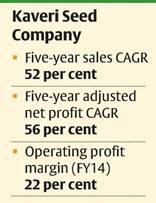
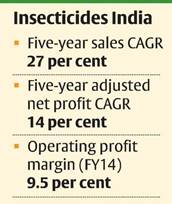

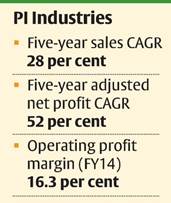
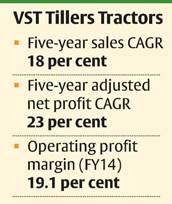
Despite erratic monsoons, not all agri-related companies fared badly. Here are the ones that can still reap gains for investors
The monsoon continues to play truant this year. After below-normal rainfall during the south-west monsoon, hopes were pinned on the north-east spell, which too has been disappointing so far. Given that over two-thirds of the country’s cultivable land is rain-fed, a weak monsoon has a bearing on agri GDP. For instance, when the country faced the worst-ever drought in 2009, agri output was depressed that year.
But is a weak monsoon always bad for agri stocks? Not quite.
Despite inconsistent monsoon over the past five years, select companies in the agri space have managed to buck the trend and deliver robust performance. Here are five agri stocks that still hold promise for investors.
Sowing profits
The evolution of technology in the seed space — from high-yielding varieties to hybrids and genetically modified (GM) ones — has played a vital role in improving crop yields. Take cotton, for instance.
While farmers have benefited from better yields on GM cotton varieties, Indian seed companies such as Mahyco (unlisted) and Kaveri Seeds Company (listed and using technology licensed by US-based Monsanto) cashed in on the success of Bt technology. Currently, Bt cotton hybrids account for almost 95 per cent of the total area under cotton cultivation.
Now that cotton hybrids have almost reached the saturation phase, where is the next big opportunity? A changing food consumption pattern in India has led to a sharp rise in demand for poultry and meat products. This has spurred demand for maize, a key ingredient in poultry feed. The poultry feed industry, which accounts for 50 per cent of maize end-use, is expected to grow at a strong pace over the next few years.
Also, healthy demand from the starch industry, yet another significant user-industry, should boost the demand for maize. Given the limited area under cultivation, use of hybrid seeds will be critical to increase output.
Unlike cotton, the penetration of maize hybrids is still low. Hybrid varieties are planted in just a third of the total area under maize cultivation.
After maize, the next wave of growth can come from rice hybrids. The need to produce more rice, which is the staple crop for a large part of the country’s population, necessitates use of hybrid seeds in place of conventional saved seeds. The area under hybrid paddy accounts for less than 10 per cent of the total acreage.
Kaveri, with presence in cotton, maize and rice, has benefited from the shift from conventional seeds to hybrid varieties. Having started off with Bt cotton, through its flagship Jaadoo and Jackpot brands, Kaveri has diversified into hybrid maize, rice, jowar, bajra and vegetable seeds. Its market share in hybrid maize has grown from about 4 per cent two years ago to over 13 per cent now.
Kaveri holds 6 per cent share in the hybrid rice segment, which now accounts for almost 7 per cent of the company’s overall revenues. The company tops the Bt cotton segment with a market share of 19.5 per cent.
With the right products and a strong distribution network of 15,000 dealers, Kaveri is set to ride the hybridisation wave in maize and rice. Its stock price has shot up from ₹42 five years ago to ₹858 now, and currently trades at about 15 times its 2015-16 expected earnings.
War against pests
Besides hybrid seeds, reduction of crop loss through effective pest management has also played a role in improving farm yield. Also, more affordability due to higher realisation for farm produce and willingness to invest more in agriculture have boosted demand for crop protection chemicals over the last few years.
Patent expiries for several innovative crop protection chemicals in the US has opened up the market for generic formulation players to export their output. Further, non-availability of agricultural labour has been a key growth driver for weedicides. This has not only helped farmers cut down on labour cost but has improved crop productivity through efficient weed management. Companies such as Insecticides India and PI Industries, which have broadened their product offerings by scaling presence in weedicides, bio-pesticides and fungicides, have sustained healthy growth over the last few years.
Despite being a late entrant into the Indian agrochemical industry, Insecticides India, which started off as an off-patent formulations company, has evolved into an integrated crop protection player. From a modest ₹3 crore in 2002-03, the company’s revenues have grown to ₹864 crore (2013-14).
The acquisition of three insecticide brands from Montari Industries laid the foundation for the scale-up in revenues. Besides brand acquisitions and generic launches, marketing tie-ups with global players such as US-based Amvac Chemicals for its Thimet brand also helped the company broaden its product offering.
The company collaborated with Japanese crop protection major Nissan Chemicals to sell its herbicide brand Hakama and Pulsor in 2012; the response to these products from the farmer fraternity has been quite positive.
In addition to in-licensing innovative agrochemicals and launching generic versions of off-patent crop chemicals, the company is also working on discovery of new molecules. This is being done through a joint venture with Japanese company Oatsuka Agri Techno Company in which Insecticides India holds 20 per cent stake. With 35 scientists working on innovative molecules, the company expects to launch its first product over the next three-four years.
However, given the risk associated with innovative research, delay beyond four years cannot be ruled out too.
In August, the company augmented its formulation manufacturing capacity at Rajasthan by 25 per cent to 75,000 tonnes per annum. It is also in the process of expanding its active ingredient facility at Gujarat by putting up two additional lines, taking the total number to 12, which will come on stream by early 2015-16. Its current product basket consists of 120 brands.
The top 20 brands account for almost 75 per cent of the company’s revenues. Over the last five years, Insecticides’ stock price has grown almost ten-fold, and currently trades around 12 times its anticipated 2015-16 earnings.
PI Industries, earlier known as Mewar Oil and General Mills, started off as a pesticide formulator 50 years back and diversified into the contract research and manufacturing business (CRAMS) in the 90s. Strong financial performance over the last five years — annual profit growth of almost 52 per cent — helped the stock price swell from ₹14 in November 2009 to ₹445 now.
The company sells a wide range of insecticides, herbicides and weedicides through a network of over 9,000 distributors.
PI Industries’ performance was weak in the first half of the current fiscal as export supplies were scheduled to be made over the second half of the year. However, its performance is expected to normalise in the second half. The order book has witnessed a healthy 26 per cent rise sequentially to $520 million (₹3,172 crore) as of September 2014; the execution of the current order book is expected to happen over the next three to four years.
PI is expanding capacity at its Jambusar facility to cater to its CRAMS business, which will be completed by early 2015-16. The company plans to launch a broad spectrum insecticide for vegetables over the next two quarters and targets one or two new launches every year over the next few years. The stock now trades about 20 times its 2015-16 expected earnings.
Betting on mechanisation
Even as availability of better quality seeds and agrochemicals has come as a boon to the farming community, non-availability of affordable labour has been a key risk threatening the sustainability of Indian agriculture. The rural employment guarantee schemes run by the Centre have added to farmers’ woes.
Bengaluru-based VST Tillers Tractors has been a major beneficiary of this growing thrust on farm mechanisation. Thanks to the highly-fragmented agricultural land in India, the demand for tillers and small tractors (below 25 horse power) has been on an upswing. VST Tillers, being a dominant player in the tiller and mini-tractor segment, has benefited from this. To encourage mechanisation, the central and state governments provide subsidy to tiller manufacturers. Despite strong demand for power tillers, delay in launching of subsidy schemes and subsidy payments by select State governments have led to muted growth in the tiller segment.
VST’s tractor sales, however, have remained healthy even as other players continue to struggle. Growth in tractor sales partly compensated for the weakness in tiller sales. The company also sells rice transplantors imported from China.
Despite the short-term hiccups, the long-term prospects for tillers remain robust. The company’s profits have grown in excess of 23 per cent annually over the last five years.
VST’s stock — it being the only listed player in the farm mechanisation space — has jumped five-fold in the last five years. It currently trades at about 11 times its 2015-16 expected earnings.
Coromandel International, the fertiliser flagship of the South-based Murugappa group, is now morphing into a farm solutions company. Coromandel scaled up its agro chemicals business through the acquisition of Gujarat-based agrochemical maker Sabero Organics. Sabero’s operations, which were impacted due to temporary halt in production on the back of environmental issues, are now back on track. From a loss of ₹61 crore in 2012, Sabero has managed to turn around operations, posting a profit of ₹8 crore in 2013.
The company’s fertiliser business, which suffered due to high inventory in the channel (distributors and dealers), is expected to improve in 2014-15. Higher availability of key raw material phosphoric acid from its Tunisian joint venture, given the capacity expansion at its Kakinda plant, should support growth over the next two-three years.
Coromandel has been providing farm mechanisation services to farmers in Andhra Pradesh. In April, it formed a joint venture with Japanese firm Yanmar Co Ltd and Mitsui & Co Pte that will provide rice planting services to farmers in Andhra Pradesh, Tamil Nadu and Karnataka. It will eventually expand the service to other states as well. Yanmar is a leading producer of rice transplanters. The joint venture company, which will initially import the equipment, aims to manufacture it indigenously over time.
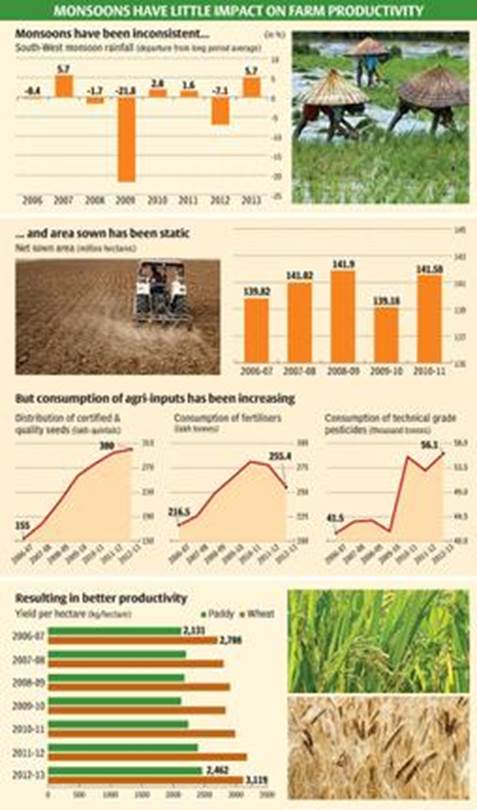
(This article was published on November 30, 2014)
We strive for newer possibilities and creatively stimulate and carve paths never explored. Our Passion for Innovation drives our core competencies to reach out and strive towards excellence.
